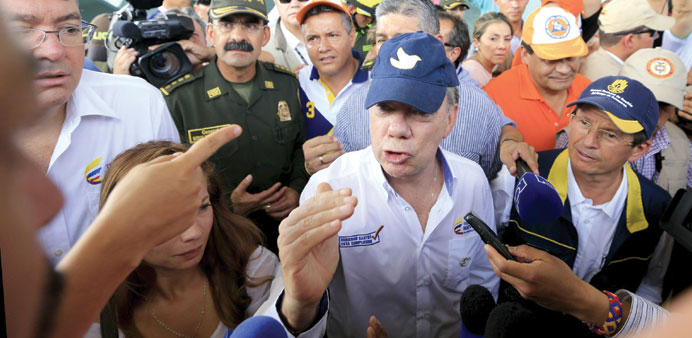AFP/Cucuta
Colombia President Juan Manuel Santos visited a tense border city amid an escalating row with neighbouring Venezuela that triggered deportations and the exodus of thousands of Colombians back home.
“I am here to make sure our fellow Colombians get the services they need,” Santos said as he began the tour of Cucuta, a far northeastern city of about 70,000 with close business ties to Venezuela and which has been on edge.
The crisis erupted on August 19 after Venezuela’s President Nicolas Maduro closed the border and then declared a state of emergency following an incident in which three Venezuelan soldiers were shot and wounded by two assailants on a motorcycle.
The two countries recalled their respective ambassadors as tensions rose. Maduro has said 3,000 troops were being deployed to search “high and low” for Colombian paramilitaries, whom he has blamed for last week’s shooting.
Since then, 1,097 Colombians have been summarily deported from Venezuela and several thousand more Colombians have fled for home, fearful of being targeted as well.
Santos stopped at a filling station in Cucuta - where people waited in line for hours to get gasoline - to reassure them that supplies would not be interrupted.
Mayor Donamaris Ramirez said that before the row, 90% of locals bought their gasoline at informal filling stations run by smugglers who get cut-rate subsidised fuel from oil-rich Venezuela.
Now motorists across the city have to rely on gasoline stations, resulting in queues as long as seven hours, fanning discontent.
In Washington, the US State Department expressed concern and urged both countries to resolve the dispute diplomatically.
In a statement late Friday, Santos vowed to continue conducting foreign relations “with firmness, but with dialogue and diplomacy.”
“We are now concentrating on attending to the humanitarian needs that this situation has generated,” he said.
Venezuela is mired in a deepening economic crisis, made worse by a plunge in oil prices, its main source of hard currency.
Widespread shortages, roaring inflation and rampant crime have undermined support for Maduro, whose ruling party faces legislative elections in December.

Colombia’s President Juan Manuel Santos speaks with a family deported from Venezuela during a visit at a temporary shelter in Villa del Rosario, Augus
